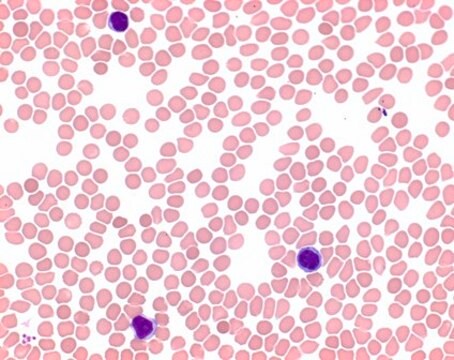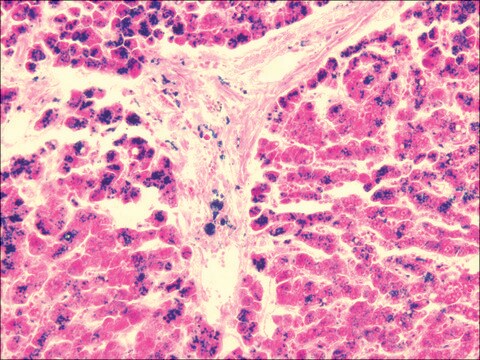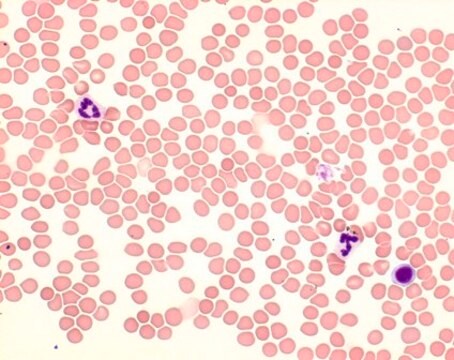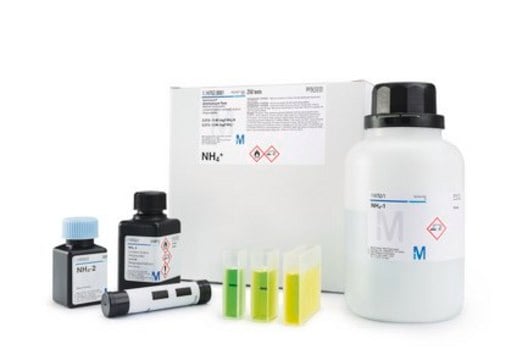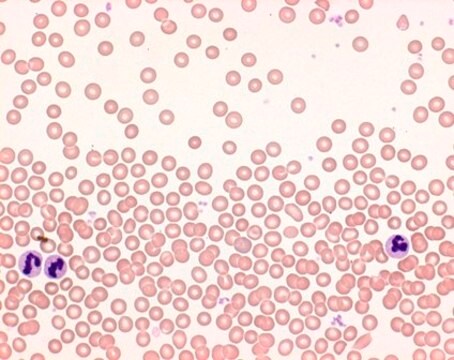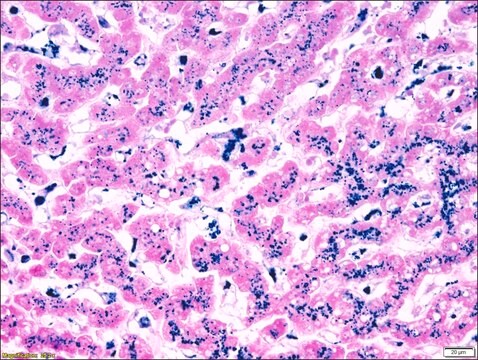1.12084
HEMATOGNOST Fe™
staining kit for the detection of free ionic iron (Fe³⁺) in cells
Anmeldenzur Ansicht organisationsspezifischer und vertraglich vereinbarter Preise
Alle Fotos(1)
About This Item
UNSPSC-Code:
41116121
Empfohlene Produkte
Qualitätsniveau
IVD
for in vitro diagnostic use
Anwendung(en)
clinical testing
diagnostic assay manufacturing
hematology
histology
Lagertemp.
15-25°C
Verwandte Kategorien
Allgemeine Beschreibung
HEMATOGNOST Fe™ - staining kit for the detection of free ionic iron (Fe3+) in cells, is used for human-medical cell diagnosis and serves the purpose of the hematological and histological investigation of sample material of human origin. HEMATOGNOST Fe™ is a staining kit for performing the so-called Prussian blue (Berlin blue) reaction in hematological and histological specimen material. This staining kit contains all the reagents necessary for the detection of free ionic iron. In the Prussian blue reaction, ionic iron (Fe3+) not bound to the heme structure reacts with potassium hexacyanoferrate(II) in hydrochloric solution. It precipitates as an insoluble complex salt in the blood, bone-marrow, or tissue cells and thus localizes free cellular iron: 4 Fe3+ + 3 K4Fe(CN)6 = Fe4[Fe(CN)6]3 + 12 K+
As a measure to achieve the best possible visual differentiation of the iron deposits in the cytoplasma, this is counterstained with nuclear fast red solution (Nuclear fast red-aluminum sulfate solution 0.1% (Product number 1.00121), resulting in a tender pink color. If further, more detailed information on the cell morphology is required, counterstaining with any of the other familiar “classical” methods such as Giemsa, (Giemsa, Product number 1.09204), May-Grünwald (May-Grünwald eosin methylene blue solution, Product number 1.01424), hemalum (Mayer′s hemalum solution, Product numer 1.09249), etc. can also be employed.
The Prussian blue reaction can also be used to stain specimens already stained by one of these classical procedures for the additional detection of iron. Repeat counterstaining is not necessary in this case.
The staining kit is sufficient for 6 - 8 stainings with up to 16 slides. The staining kit is developed and registered as CE / IVD product for applications in diagnostics. For more details, please see instructions for use (IFU). The IFU can be downloaded from this webpage.
As a measure to achieve the best possible visual differentiation of the iron deposits in the cytoplasma, this is counterstained with nuclear fast red solution (Nuclear fast red-aluminum sulfate solution 0.1% (Product number 1.00121), resulting in a tender pink color. If further, more detailed information on the cell morphology is required, counterstaining with any of the other familiar “classical” methods such as Giemsa, (Giemsa, Product number 1.09204), May-Grünwald (May-Grünwald eosin methylene blue solution, Product number 1.01424), hemalum (Mayer′s hemalum solution, Product numer 1.09249), etc. can also be employed.
The Prussian blue reaction can also be used to stain specimens already stained by one of these classical procedures for the additional detection of iron. Repeat counterstaining is not necessary in this case.
The staining kit is sufficient for 6 - 8 stainings with up to 16 slides. The staining kit is developed and registered as CE / IVD product for applications in diagnostics. For more details, please see instructions for use (IFU). The IFU can be downloaded from this webpage.
Hinweis zur Analyse
Kaliumhexacyanoferrat II (Reagenz 1): 4.5 - 5.5 %
Salzsäure (Reagenz 2): 4.5 - 5.5 %
Dichte (Reagenz 3 d 20 °C/4 °C): 1.040 - 1.060
Eignung für die Mikroskopie: entspricht
Salzsäure (Reagenz 2): 4.5 - 5.5 %
Dichte (Reagenz 3 d 20 °C/4 °C): 1.040 - 1.060
Eignung für die Mikroskopie: entspricht
Rechtliche Hinweise
HEMATOGNOST FE is a trademark of Merck KGaA, Darmstadt, Germany
Signalwort
Danger
H-Sätze
Gefahreneinstufungen
Eye Dam. 1 - Met. Corr. 1
Lagerklassenschlüssel
8B - Non-combustible, corrosive hazardous materials
WGK
WGK 1
Flammpunkt (°F)
Not applicable
Flammpunkt (°C)
Not applicable
Analysenzertifikate (COA)
Suchen Sie nach Analysenzertifikate (COA), indem Sie die Lot-/Chargennummer des Produkts eingeben. Lot- und Chargennummern sind auf dem Produktetikett hinter den Wörtern ‘Lot’ oder ‘Batch’ (Lot oder Charge) zu finden.
Besitzen Sie dieses Produkt bereits?
In der Dokumentenbibliothek finden Sie die Dokumentation zu den Produkten, die Sie kürzlich erworben haben.
Unser Team von Wissenschaftlern verfügt über Erfahrung in allen Forschungsbereichen einschließlich Life Science, Materialwissenschaften, chemischer Synthese, Chromatographie, Analytik und vielen mehr..
Setzen Sie sich mit dem technischen Dienst in Verbindung.